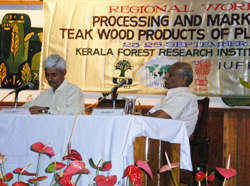Teak (Tectona grandis L.f ) is being grown in plantations in more than 36 tropical countries across the globe although its natural occurrence is limited to India, Laos Myanmar and Thailand. Of the estimated 187.1 million hectares of global forest plantations in 2000, about 5.7 million hectares (3%) were teak, representing about 75% of the world’s high-quality tropical hardwood plantations, the major producers being India, Indonesia, Myanmar and Thailand in the Asia Pacific region. It is little wonder that teak excites more interest among the general public than any other tropical hardwood for its versatile wood with sterling properties.The rapid expansion of the teak plantations, however, poses a risk of undermining its reputation in global market place because of wide variations in wood quality with the net effect of reducing the prices and therefore the financial viability of teak planting programmes. To avoid this, teak growers, at the community and industrial levels, must ensure that the wood they produce is of the highest possible quality, which will mean choosing the right sites carefully, using good genetic stock, employing optimal rotation cycles and appropriate silvicultural techniques.
Timber trade and SFM are the two key components of globalization and sustainable development of teakwood sector, in this sense a Regional Workshop in Processing and Marketing of Teak Wood Products of Planted Forest, was held in Peechi, India on 25-28 September 2007 at the Kerala Forest Research Institute with the financial support of ITTO, as part of the project PD 416/06 (I). The Workshop addressed the major challenges of ‘new age eco-products’ of teak that use innovative technologies for quicker production of quality timber and value addition to the products together with reducing wood waste for overcoming the limitations of small dimensional new resources.
The major objectives of the Regional Workshop were:
- Clear understanding of national policies and programmes of the producer countries as project partners particularly in promoting the trade from further processing and marketing of teak products
- Identification of the lead countries in relevant areas of research and training as well as networking to cater to the needs of the international stakeholders
- Establishment of working relationships with necessary commitments from among the project partners for developing a regional project on teak.
A total of 90 delegates representing 14 countries of Asia, Australia, Europe, Central and South America participated in the 4-day Workshop including one day field excursion. In addition to the scientists/researchers from various Organizations / universities, the target beneficiaries of the Workshop were small timber holders / farmers, processing enterprises, traders, State Forest Departments, Forest Development Corporations and Policy Makers.
A total of 20 oral papers and 18 posters were presented in nine different sessions including panel discussions. Major technical presentations included the following topics:
- Processing of planted teak in producer countries: Problems and prospects.
- International pricing mechanism for the wood of planted teak.
- Teak farming: challenges and opportunities.
- Genetic resources for higher productivity of planted teak forest.
- Investments and economic returns from teak plantations.
- Quality control and mass production of teak clones for tropical plantations.
- Improvement of planted teakwood by Vrikshayurved methods.
- Aspects of natural decay resistance and hysterisis of juvenile teak thinnings from Southern Mato Grosso, Brazil.
- Benefits and challenges of certification with regard to the sustainability of planted teak forests.
- Wood Quality of planted teak outside forests.
- Country reports from India, Indonesia, Malaysia, and Thailand.
During the workshop discussions on a regional project formulation for be later submitted to ITTO on further processing of teak products coming from plantations and to create capacity building among target beneficiaries in regards to market such products were held. Major recommendations for drafting such regional proposal include:
- Up date the context of the project with in the region;
- Focus on value add processing according to the market demands;
- Get early involvement from relevant stakeholders, specially the industry which will be the main beneficiary;
- Think of the sustainability of the project itself in the long term; and
- Highlight the administrative arrangements among the countries involved for effective coordination of the project.
Another important recommendation that rose from the workshop was the need to improve the genetic material for teak plantations as well as to look into the possibility of exchanging such genetic material within the countries involved in the project.
